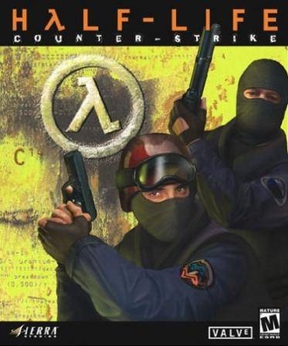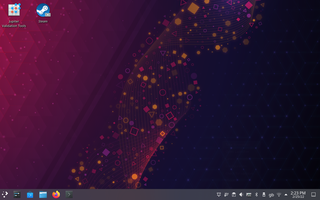
Counter-Strike is a tactical first-person shooter game developed by Valve. It was initially developed and released as a Half-Life modification by Minh "Gooseman" Le and Jess Cliffe in 1999, before Le and Cliffe were hired and the game's intellectual property acquired. Counter-Strike was released by Valve for Microsoft Windows in November 2000, and is the first installment in the Counter-Strike series. Several remakes and ports were released on Xbox, as well as OS X and Linux.

A product key, also known as a software key, serial key or activation key, is a specific software-based key for a computer program. It certifies that the copy of the program is original.

Steam is a video game digital distribution service and storefront developed by Valve Corporation. It was launched as a software client in September 2003 to provide game updates automatically for Valve's games, and expanded to distributing third-party titles in late 2005. Steam offers various features, like game server matchmaking with Valve Anti-Cheat measures, social networking, and game streaming services. Steam client's functions include game update automation, cloud storage for game progress, and community features such as direct messaging, in-game overlay functions and a virtual collectable marketplace.

Valve Anti-Cheat (VAC) is an anti-cheat tool developed by Valve as a component of the Steam platform, first released with Counter-Strike in 2002.

Garry's Mod is a 2006 sandbox game developed by Facepunch Studios and published by Valve. The base game mode of Garry's Mod has no set objectives and provides the player with a world in which to freely manipulate objects. Other game modes, notably Trouble in Terrorist Town and Prop Hunt, are created by other developers as mods and are installed separately, by means such as the Steam Workshop. Garry's Mod was created by Garry Newman as a mod for Valve's Source game engine and released in December 2004, before being expanded into a standalone release that was published by Valve in November 2006. Ports of the original Windows version for Mac OS X and Linux followed in September 2010 and June 2013, respectively. As of September 2021, Garry's Mod has sold more than 20 million copies. A successor, Sandbox, has been in development since 2015.

Steam Machine is a discontinued series of small form factor gaming computers by Valve, designed to operate SteamOS to provide a game console-like experience. Several computer vendors were engaged with Valve to develop their own versions of Steam Machines for retail, offering additional options atop Valve's requirements such as dual-booting options with Microsoft Windows and the ability to upgrade the computer. Consumers could digitally purchase video games on their Steam Machine through Valve's namesake Steam storefront.

SteamOS is a Linux distribution developed by Valve. It incorporates Valve's popular namesake Steam video game storefront and is the primary operating system for the Steam Deck, Valve's portable gaming device, as well as Valve's earlier Steam Machines. SteamOS is open source with some closed source components.
Early access, also known as alpha access, alpha founding, paid alpha, or game preview, is a funding model in the video game industry by which consumers can purchase and play a game in the various pre-release development cycles, such as pre-alpha, alpha, and/or beta, while the developer is able to use those funds to continue further development on the game. Those that pay to participate typically help to debug the game, provide feedback and suggestions, may have access to special materials in the game. The early-access approach is a common way to obtain funding for indie games, and may also be used along with other funding mechanisms, including crowdfunding. Many crowdfunding projects promise to offer access to alpha and/or beta versions of the game as development progresses; however, unlike some of these projects which solicit funds but do not yet have a playable game, all early access games offer an immediately playable version of the unfinished game to players.

LDLC OL is a French esports organization with players competing in Counter-Strike: Global Offensive, Fortnite Battle Royale, League of Legends, PlayerUnknown's Battlegrounds and World Rally Championship.

The Culling was a first-person action battle royale game developed and published by Xaviant. Following an early access beta phase, the game was released for Linux, Microsoft Windows, and Xbox One on October 5, 2017.

PUBG: Battlegrounds is a battle royale game developed by PUBG Studios and published by Krafton. The game, which was inspired by the Japanese film Battle Royale (2000), is based on previous mods created by Brendan "PlayerUnknown" Greene for other games, and expanded into a standalone game under Greene's creative direction. It is the first game in the PUBG Universe series.
A battle royale game is an online multiplayer video game genre that blends last-man-standing gameplay with the survival, exploration and scavenging elements of a survival game. Battle royale games involve dozens to hundreds of players, who start with minimal equipment and then must eliminate all other opponents while avoiding being trapped outside a shrinking "safe area", with the winner being the last player or team alive.

Brendan Greene, better known as PlayerUnknown, is an Irish video game developer. He is best known for his work on PUBG: Battlegrounds. He left active development on the game to form PUBG Special Projects and PlayerUnknown Productions in March 2019.
Fortnite Battle Royale is a free-to-play battle royale video game developed and published by Epic Games. It is a companion game to Fortnite: Save the World, a cooperative survival game with construction elements. It was initially released in early access on September 26, 2017, for macOS, PlayStation 4, Windows, and Xbox One, followed by ports for iOS, Nintendo Switch, and Android. Epic dropped the early access label for the game on June 29, 2020. Versions for the Xbox Series X/S and PlayStation 5 were released as launch titles in late 2020.

In the video game industry, a battle pass or rewards track is a type of monetization approach that provides additional content for a game usually through a tiered system, rewarding the player with in-game items for playing the game and completing specific challenges. Inspired by the season pass ticketing system and originating with Dota 2 in 2013, the battle pass model gained more use as an alternative to subscription fees and loot boxes beginning in the late 2010s. Battle passes tend to offer free passes, which are available to all users, and premium passes that require annual or seasonal charges in exchange for enhanced items and cosmetics.

Proton is a compatibility layer for Windows games to run on Linux-based operating systems. Proton is developed by Valve in cooperation with developers from CodeWeavers. It is a collection of software and libraries combined with a patched version of Wine to improve performance and compatibility with Windows games. Proton is designed for integration into the Steam client as "Steam Play". It is officially distributed through the client, although third-party forks can be manually installed.

CRSED: Cuisine Royale is a battle royale multiplayer online shooter video game developed by Latvian studio Darkflow Studio and published by Gaijin Entertainment. It was previously known as Cuisine Royale. The game was officially launched on December 19, 2019, and was relaunched under a new name in December 2020. It is a free-to-play game with optional microtransactions.

The Steam Deck is a handheld gaming computer developed by Valve and released on February 25, 2022. The device uses Valve's Linux distribution SteamOS, which incorporates the namesake Steam storefront. SteamOS uses Valve's Proton compatibility layer, allowing users to run Windows applications and games. In addition to handheld use, the Steam Deck can be connected to a TV or monitor through a docking station and be used like a desktop computer or home video game console. In desktop mode, users can install third-party applications for Linux.

PUBG Mobile is a free-to-play battle royale video game co-developed by LightSpeed & Quantum Studio and PUBG Studios. It is a mobile game adaptation of PUBG: Battlegrounds. It was initially released for Android and iOS on 19th of March 2018.
















